WelCom, September 2024
World Day of Prayer for the Care of Creation: 1 September 2024
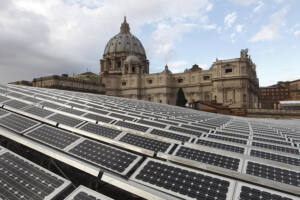
Te Wāhanga o te Orokohanga 2024: 1 Mahuru – 4 Whiringa-ā-Nuku
Season of Creation 2024: 1 September–4 October
Me Mahitahi, me Tūmanakohia tahi me te Orokohanga “Hope and Act with Creation”
The annual World Day of Prayer for the Care of Creation is celebrated on 1 September. The ecumenical Christian celebration of the Season of Creation is convened each year to pray and respond to the cry of Creation, between 1 September, the World Day of Prayer for Creation, and 4 October, the Feast of St Francis of Assisi.
Every year, Pope Francis issues a message for the World Day of Prayer for the Care of Creation. Francis’ message for 2024 with the theme: ‘To Hope and Act with Creation’, was released on 27 June.
In his message Pope Francis reminds us how the Holy Spirit ‘keeps the believing community alert and calls it to conversion in lifestyles, to resist human degradation of the environment.’
The Holy Father calls us, with the assistance of the Holy Spirit, to seek to live ‘a life that becomes a song of love for God, for humanity, with and for creation, and that finds its fullness in holiness.’
Acting with hope
Ian Munro, Member of the Archdiocese’s Ecology, Justice and Peace Commission
“Despite all attempts to deny, conceal, gloss over or relativise the issue, the signs of climate change are here and increasingly evident. No one can ignore the fact that in recent years we have witnessed extreme weather phenomena, frequent periods of unusual heat, drought and other cries of protest on the part of the earth that are only a few palpable expressions of a silent disease that affects everyone.” – Pope Francis, Laudate Deum [5].
Monthly, perhaps even weekly, new warnings are sounded based on verifiable scientific data. In early July, the Copernicus Climate Change Service reported that June 2024 was warmer than any previous June in the data record and the annual global temperature for the previous 12 months was 1.64°C above the pre-industrial average. Further, global data for Sunday 21 July shows it to be the hottest day that’s ever been logged. In other words, for the first time, the goal of keeping the annual temperature increase to no more than 1.5°C above the pre-industrial average has been breached.
While one year may be put down to a statistical oddity, it does show where we are headed and that not achieving the 1.5°C limit is now a distinct possibility. Our one hope is that this is a one-off, bearing in mind, too, the average is calculated over a decade rather than over just one or two years.
July also brought the news from Stats NZ that our oceanic and coastal water temperatures hit record highs that exceeded global averages over a ten-year period. It seems our oceans are not going to protect us from the excesses of global warming as previously believed but are going to seriously disrupt both our marine and land ecosystems.
‘If present trends continue,’ writes Pope Francis in Laudato si’, ‘this century may well witness extraordinary climate change and an unprecedented destruction of ecosystems, with serious consequences for all of us.’ [24]
Season of Creation focus
Excessive carbon dioxide and methane production means our earth systems are in crisis, which is the reason the focus of this year’s Season of Creation is on the Fossil Fuel Non-Proliferation Treaty (FFNPT). Pope Francis notes that, despite the many negotiations and agreements, global emissions continue to increase. ‘The necessary transition towards clean energy sources, such as wind and solar energy, and the abandonment of fossil fuels is not progressing at the necessary speed.’ [Laudate Deum, 55]
The Treaty aims to bring together nations, civil society, and faith groups to reduce fossil fuel use. It is a global effort by the Fossil Fuel Non-Proliferation Treaty Initiative to foster international cooperation to speed up a transition to renewable energy for everyone.
The Treaty rests on three pillars.
- Non-proliferation: halting the exploration and expansion of any new coal, oil, or gas reserves immediately.
- A fair phaseout: a just and balanced strategy to gradually reduce existing fossil fuel production in keeping with what science shows is needed to address the climate crisis. Key steps include regulating fossil fuel supply, limiting extraction, eliminating production subsidies, and dismantling unnecessary infrastructure.
- A just transition: accelerating globally the transition to renewable energy and promoting economic diversification away from fossil fuels in a way that is fair and equitable so no worker, community, or country is left behind and the rights of indigenous peoples and affected communities are safeguarded.
To date, 13 countries have called for the Treaty at the United Nations and 120 countries are on record calling for a transition away from fossil fuels at COP28; but not a phasing out – oil can still be extracted according to demand.
Nonetheless, Pope Francis believes that, ‘If we are confident in the capacity of human beings to transcend their petty interests and to think in bigger terms, we can keep hoping that COP28 will allow for a decisive acceleration of energy transition, with effective commitments subject to ongoing monitoring.’ [Laudate Deum, 54]
Global Day of Action
The Season of Creation runs from September 1 through October 4 and the world’s 2.2 billion Christians are invited ‘To Hope and Act with Creation’ during this time. Saturday, 21 September has been scheduled as the Global Day of Action for individuals, communities, organisations, and all levels of government to focus on the ecumenical call to endorse the FFNPT.
To nurture and preserve all of God’s Creation is fundamental to our Christian faith. Faith leaders and church communities can endorse FFNPT through the Faith Letter for a Fossil Fuel Treaty.
Archbishop Paul Martin sm and the Ecology Justice and Peace Commission of the Archdiocese of Wellington have become signatories and endorsed the call. This action joins other Catholic initiatives, such as divestment from fossil fuels and ecological conversion to more sustainable and less fossil fuel-dependent lifestyles. In doing so, we can then hope for a better world free from the monopoly of fossil fuels and from other extractive practices, because, as Pope Francis says, ‘we know that things can change’.
The UN General Assembly will be holding its 79th Session from 10 to 24 September and it is intended that, in this context and as a global Christian family, our voices will show faith communities can be powerful actors for justice and hope across the world.
All signatures collected will also be used by the FFNPT Initiative to influence decision-makers at the next UN conference on climate change, COP29, scheduled for November 2024 in Azerbaijan.
‘The demands that rise up from below throughout the world, where activists from very different countries help and support one another, can end up pressuring the sources of power. It is to be hoped that this will happen with respect to the climate crisis.’ [Laudate Deum, 38]
What can we do?
We need a world free from the monopoly of fossil fuels. And we can act with hope by supporting FFNPT and:
- participate in the 21 September Global Day of Action; encourage people we know to sign the faith letter;
- hold and participate in events to call on political leaders to sign the FFNPT; and
- plan and prepare prayer services, public actions, and vigils.
‘The urgent challenge to protect our common home includes a concern to bring the whole human family together to seek a sustainable and integral development, for we know that things can change. The Creator does not abandon us; he never forsakes his loving plan or repents of having created us. Humanity still has the ability to work together in building our common home.’ [Laudato si’, 13].
We hope for a world free from the monopoly of fossil fuels. And we can act with hope, this Season of Creation, by supporting the FFNPT.
Useful links:
The Fossil Fuel Non-Proliferation Treaty Initiative: https://fossilfueltreaty.org
Season of Creation 2024: seasonofcreation.org
Faith Letter: fossilfueltreaty.org/faith-letter#faith-letter
Laudato Si’ Movement: www.laudatosi.org/action/climate-protection/the-fossil-fuel-treaty/
Laudate Deum: www.vatican.va/content/francesco/en/apost_exhortations/documents/20231004-laudate-deum.html
Pope Francis’ World Day of Prayer 2024 message: www.vatican.va/content/francesco/en/messages/cura-creato/documents/20240627-messaggio-giornata-curacreato.html
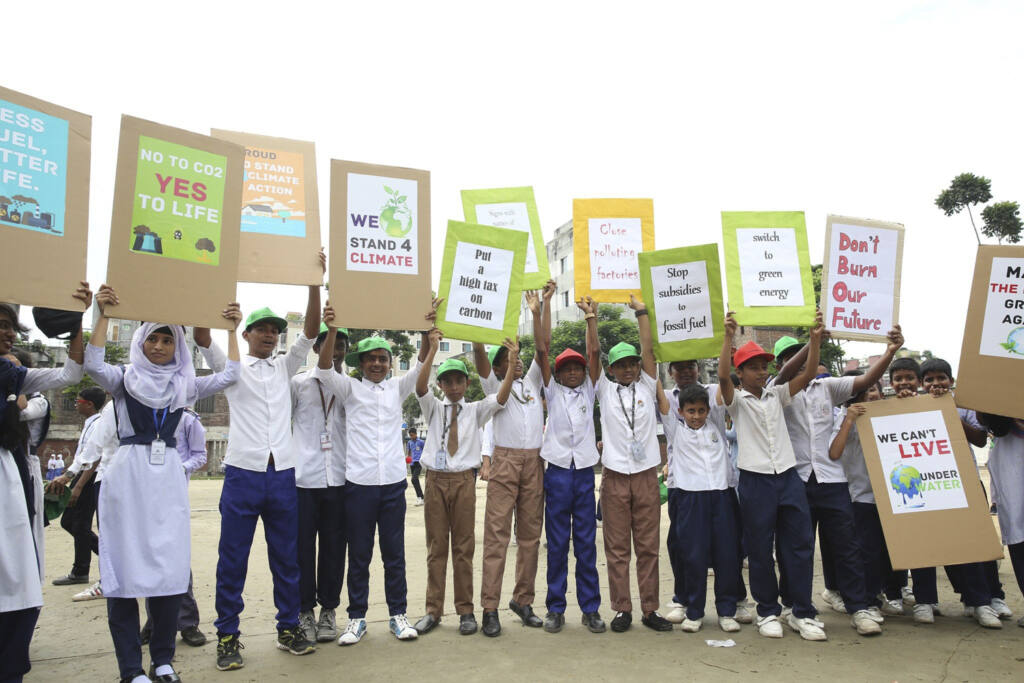
Day of Prayer for Creation
The World Day of Prayer for Creation began 35 years ago, among the world Orthodox Christian community, when the late Ecumenical Patriarch Demetrios issued the first encyclical inviting ‘all people of goodwill to dedicate 1 September as a special day of prayer for the preservation of the natural environment.’ On 1 September, 2015 to mark the occasion, Patriarch Bartholomew, the 270th Archbishop of Constantinople and Ecumenical Patriarch since 2 November 1991, issued an encyclical to call to dwell in harmony with God’s creation, ‘to remind churches and people of goodwill about the grave risks deriving from growing abuse of energy resources, threatening to increase global warming and the sustainability of the natural environment.’
In an ecumenical gesture of global significance Pope Francis announced in August 2015, that the Catholic Church will also recognise 1 September as the World Day of Prayer for the Care of Creation, encouraging the Catholic community around the world to pray for our common home. The day is inspired by Pope Francis’ landmark encyclical Laudato si’, which calls on ‘every person living on this planet” to care for our shared Earth.
Every year, Pope Francis issues a message for the World Day of Prayer for the Care of Creation.
The theme for 2024 is ‘Hope and Act with Creation’ which draws its inspiration from the Letter of St Paul to the Romans (Romans 8:19-25).
The Season of Creation
The Season of Creation is the annual ecumenical Christian celebration to pray and respond together to the cry of creation: to unite around the world unites to listen and care for our common home.
The season’s ‘celebration’ begins 1 September, the Feast of Creation, and ends 4 October, the Feast of St Francis of Assisi, the patron saint of ecology. This year’s uniting theme is ‘To hope and act with Creation’ with the symbol ‘The firstfruits of hope”, inspired by Romans 8:19-25.
Amid the triple planetary crisis of climate change, biodiversity loss, and pollution, many are beginning to despair and suffer from eco-anxiety. As people of faith, we are called to lift the hope inspired by our faith, the hope of the resurrection. This is not a hope without action but one embodied in concrete actions of prayer and preaching, service and solidarity.
This season, Christians are also uniting through a joint advocacy initiative to support the Fossil Fuel Non-Proliferation Treaty which calls for a halt to new fossil fuel projects.
Sources: seasonofcreation.org
tinyurl.com/Season-of-Creatio-Guide-2024
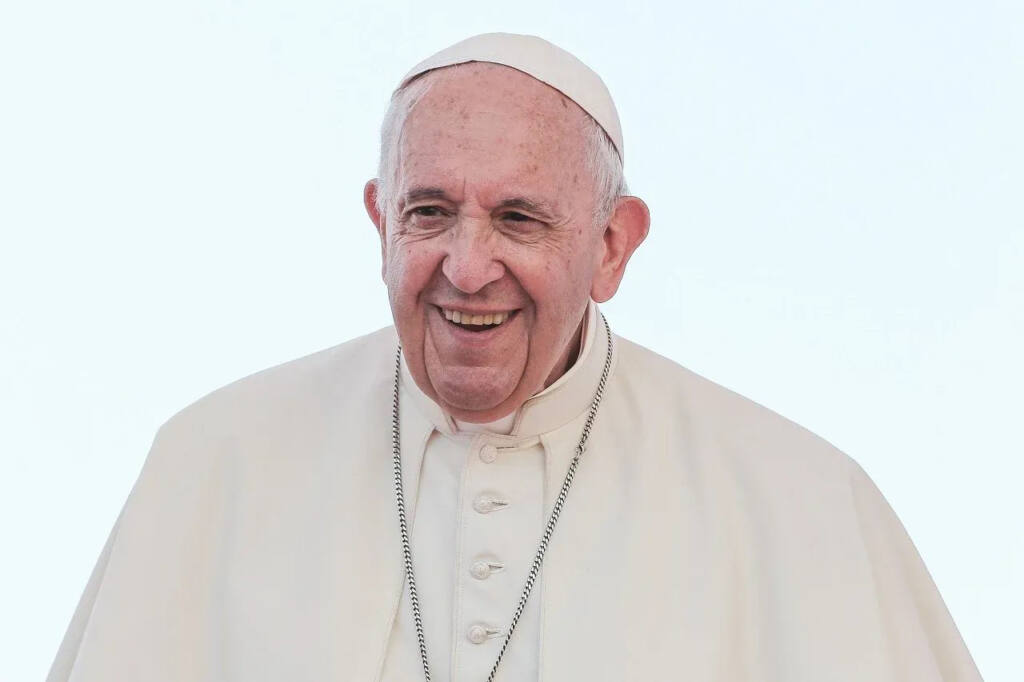
Despite all attempts to deny, conceal, gloss over or relativise the issue, the signs of climate change are here and increasingly evident. No one can ignore the fact that in recent years we have witnessed extreme weather phenomena, frequent periods of unusual heat, drought and other cries of protest on the part of the earth that are only a few palpable expressions of a silent disease that affects everyone. … I ask everyone to accompany this pilgrimage of reconciliation with the world that is our home and to help make it more beautiful.
– Pope Francis in a statement in the lead up to COP28, Dubai 2023, in which he called on world leaders to increase the pace of the fight against climate change, warning some areas of climate change are already irreversible.
Restoration project at Pukekaraka
Pā Peter Healy sm, a member of the archdiocese Integral Ecology Committee, has been working for more than eight years with various community groups to create and restore a native trees’ area at Pukekaraka, Ōtaki. His recent planting of 200 more trees, as he describes below, highlights this year’s Season of Creation theme: ‘To Hope and Act with Creation’.
‘The best antidote against the misuse of our common home is contemplation.’ – Pope Francis
Pukekaraka, is a wāhi tapu on the ancestral land of Ngāti Kapu. It is a site of spiritual significance for local Māori. Pukekaraka is a ‘hill of karaka trees’, a hill for karakia and reflection, a hill with a view of our local marae, Ōtaki township and our rural surrounds. The area planted this year was cleared of blackberry vines and boxthorn trees and re-fenced. What was a steep sandhill left to wild exotics and grazing is slowly being regenerated.
Year by year, since 2016, this site is becoming a shelter for birds, insects and microbial life. Our small stand of native trees is becoming a place to contemplate with nature.
Kāpiti Coast District Council provided funding to purchase trees from our local nursery. We were blessed with a fine, winter planting day in mid-July. The local Catholic Worker community, the Carbon Forest group from Energise Ōtaki and a group from Māoriland joined us. A number of young people joined our planting day; this assures us of a future for trees and people. We had our 200 trees in the ground in time for lunch. The lively conversations over soup and scones indicated what a fine community-building exercise tree planting always is.
The planting day began with karakia, we invoked our Creator God, Mary our Mother and the local ancestors in a blessing on the work of the day. We were mindful too, of the 2024 Season of Creation and the Laudato si’ goals. Tree planting joins us with the goals of the Cry of the Earth, community participation, ecological education and spirituality.
Our puke is becoming both a haven for wildlife and a place of contemplation. As Pope Francis reminds us, it is this practice that is the best antidote for the misuse of our common home.
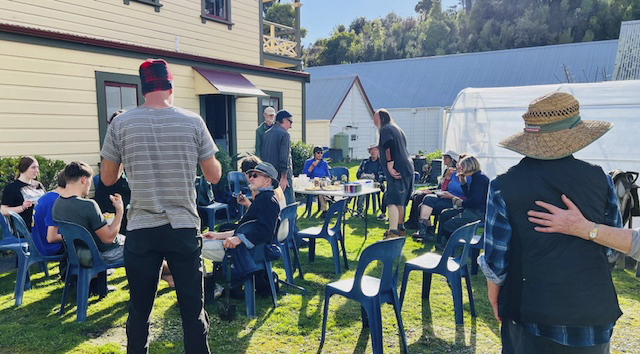
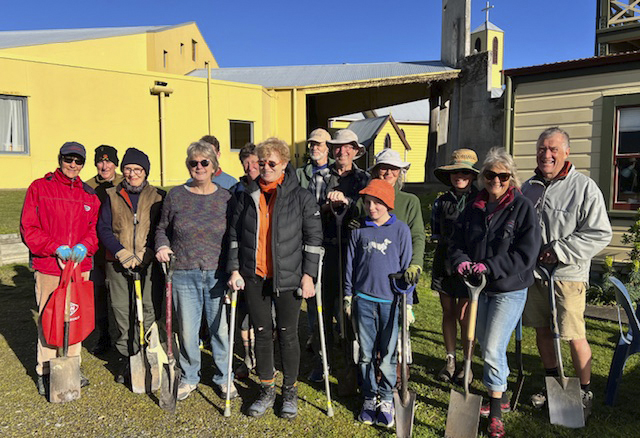
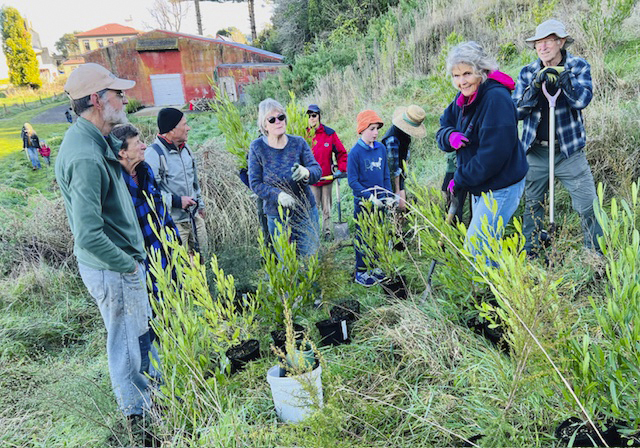
Season of Creation prayer walks – all welcome
Sunday 15 September: Ecumenical River Prayer Walk – Te Awa Kairangi | Hutt River, from Harcourt Park Upper Hutt to Petone foreshore, 8am– 6pm. Walk all or any section of river trail. Activity booklet for young people and prayer/songbook available. Visit Facebook: Te Awa Kairangi Prayer Walk (public group) or email Martin de Jong at kesyoung@gmail.com for more information.
Sunday 22 September: Hope and Act with Creation: Kaitiaki at Ōtari – walk with Catholic Parish of Ōtari, St Anne’s Anglican Church Northland and St Luke’s Anglican Parish Wadestown communities, 2pm start, Ponga Lawn behind Ōtari/Wilton Bush main entrance. Bring kai for afternoon tea on Cockayne Lawn. Wet weather, 2pm, St Thomas More Church, 30 Worcester St, Wilton. Contact Estelle Henrys at ev.henrys@gmail.com for details.